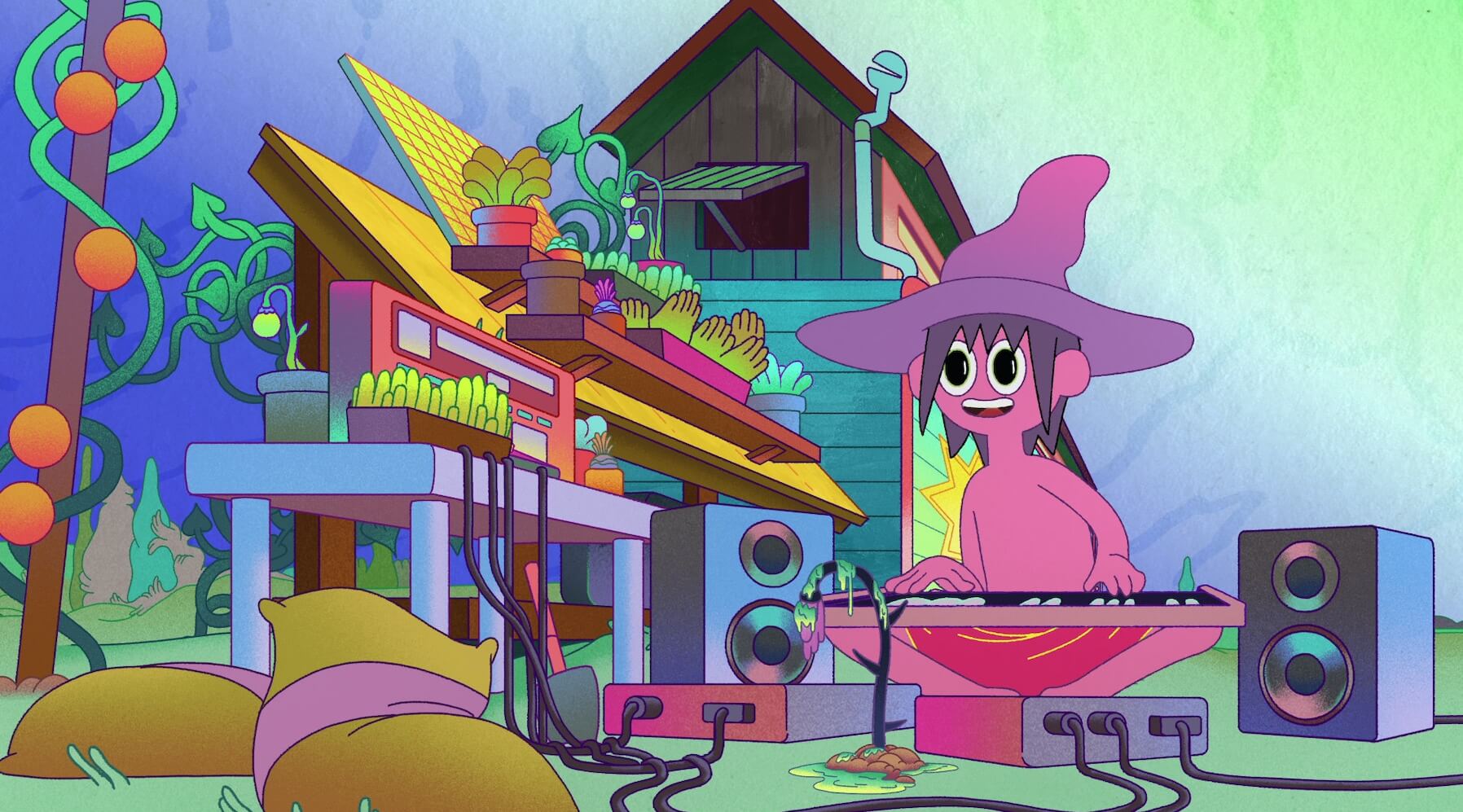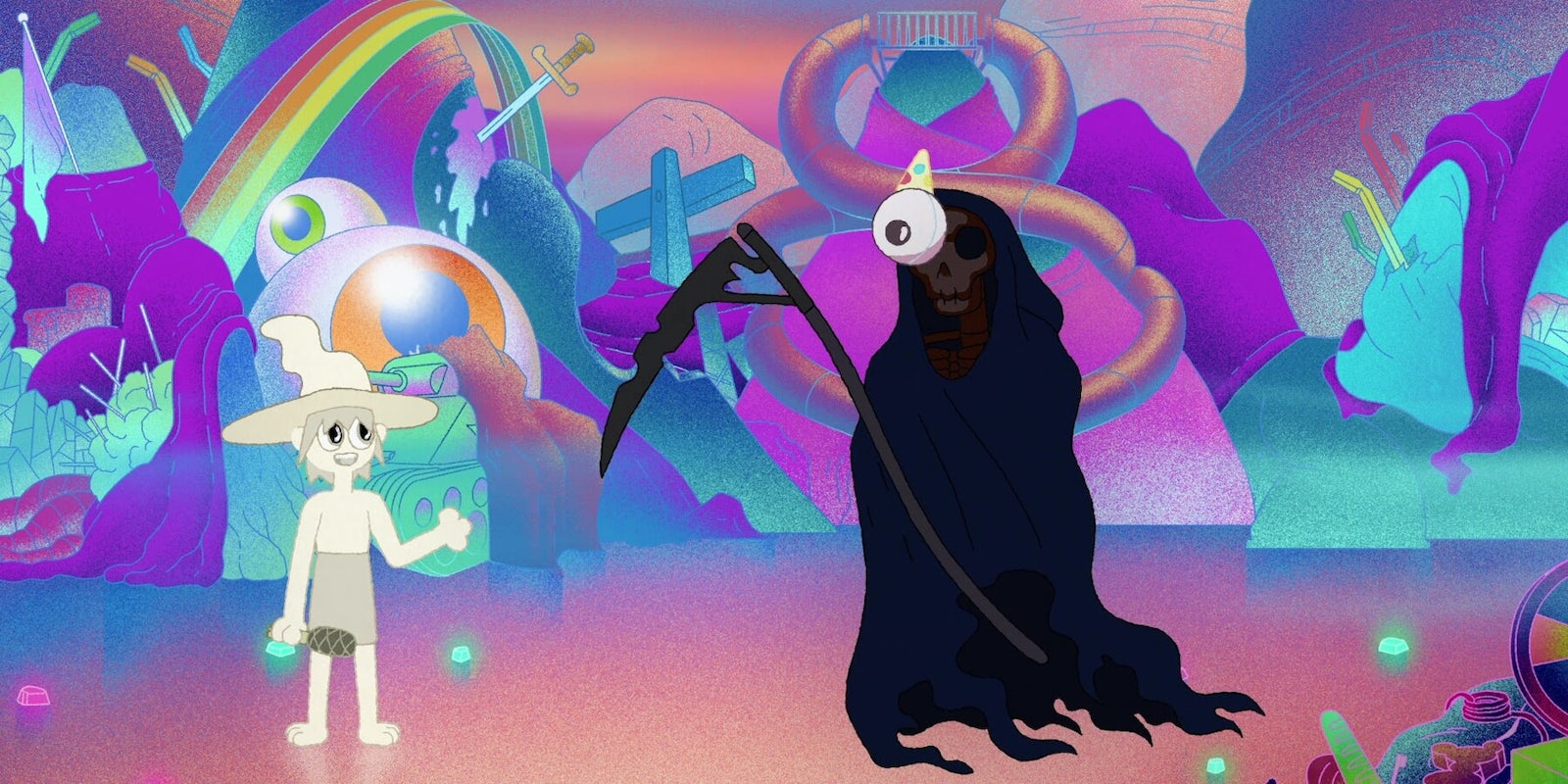Duncan Trussell and Pendleton Ward’s The Midnight Gospel is unlike anything else on television. That phrase may be a cliché in criticism, but here, it’s true.
CREATORS: Duncan Trussell and Pendleton Ward
STREAMING: Netflix
Science fiction is often about big ideas. But this show’s themes—mindfulness, spiritual nourishment, and the inevitability of death—are engaged in a way so uniquely direct as to make them feel revelatory.
Oh, the show will receive plenty of the obvious comparisons. It will be compared to Adventure Time, Ward’s beloved Cartoon Network show, and to Rick and Morty, because it’s irreverent and takes place in multiple dimensions. It may even receive less obvious comparisons. It may call to mind the animated works of Terry Gilliam, and The Yellow Submarine, or Adult Swim’s new age–mining and equally bizarre Xavier: Renegade Angel and its deliberately offensive visual overload Superjail!, another series produced by the mad geniuses at Titmouse, Inc. Fans of European and Japanese animation may find in it echoes of René Laloux’s otherworldly French masterpiece Fantastic Planet, or Italian animator Bruno Bozzetto’s Fantasia parody Allegro non Troppo, or Eiichi Yamamoto’s brutally beautiful Belladonna of Sadness, all 1970s cult classics.
The influences don’t end at animation, either. Art history nerds will find that it screams of Hieronymus Bosch and M.C. Escher. Counterculture heads will see its psychedelic and spiritual debts to Timothy Leary and Baba Ram Dass. Yet for all its cultural collaging, The Midnight Gospel does something entirely new.
The series is, in effect, an animated podcast, and the bulk of its auditory material comes from episodes of the Duncan Trussell Family Hour, in which Trussell, a comedian with a clear and diverse interest in meditation, mindfulness, and spiritual disciplines, interviews cultural figures from a wide range of backgrounds and expertises. The podcast’s relaxed style results in free-wheeling conversations that would seem to reject direct adaptation into another form.
Ward’s hallucinatory visuals take care of that illusion. The show’s visual iconography is as complex and dense as its subjects, which range from Buddhism to the traditions of Western magick to America’s funerary industrial complex. The animation sometimes directly parallels the conversations Trussell has with such figures as Damien Echols (of the West Memphis Three, now a practitioner and teacher of the hermetic arts), author Anne Lamott, and the mortician Caitlin Doughty; at other times, it seems utterly disjointed, asking viewers to find connections of their own while digesting the dizzying discussions and visual overabundance with which they are confronted. This is decidedly not a show for binge-watching, platform be damned.

There are misses that can’t be ignored. Every guest star that receives opening credits billing is white, including the experts on Eastern spiritual practices. The villain of the show’s fourth episode—one of the only episodes with a central villain, or indeed any easily discernible plot arcs at all—indulges in the sort of negative queer-coding seen in the “sissy villain” trope. The show can feel a bit like an overdose on occasion than a pure trip, as its episodes are so dense that their powerful moments can feel tough to parse. That last facet, though, may not even necessarily be a stumble so much as a price of entry; that the series required repeated watching in order to review may be more of an argument for its brilliance than against it.
It’s rare to find a work of science fiction on television less concerned with plot or world-building at its center, in spite of its successes at both. It’s rare, too, to find such a masterclass in balancing Big Ideas with absurdist humor, let alone in the span of a 20-to-36-minute episode. It has a remarkable ability to trade in potentially offensive humor, from the occasionally over-the-top visceral or scatological imagery to, say, Trussell’s equating of meditation with “shoving a buttplug in the asshole of your mind,” and yet it interrogates some of life’s biggest questions with face-on and with something bordering on grace. It will likely prove nearly impossible for most viewers to watch the show’s final episode and not find themselves in tears.
The sheer humanism of the show is a gift, both for the uncertain times in which we find our world now and for the society we will need to recreate, in a better form, whenever those times end. Its clear awareness that understanding the ephemeral travails of being human, for ourselves and for others, is as compelling as it is moving. Whether its finale sets itself up for another season is tough to say. And yet, both concerning the show and the human condition it so aptly assesses, that should not matter; as Dass puts it, it’s best just to “be here now.”
Still not sure what to watch tonight? Here are our guides for the absolute best movies on Netflix, must-see Netflix original series, documentaries, docuseries, and movies.
Looking for something more specific? Here are our Netflix guides for the best war movies, documentaries, anime, indie flicks, true crime, food shows, rom-coms, LGBT movies, alien movies, gangster movies, Westerns, film noir, and movies based on true stories streaming right now. There are also sad movies guaranteed to make you cry, weird movies to melt your brain, old movies when you need something classic, and standup specials when you really need to laugh. Or check out Flixable, a search engine for Netflix.


